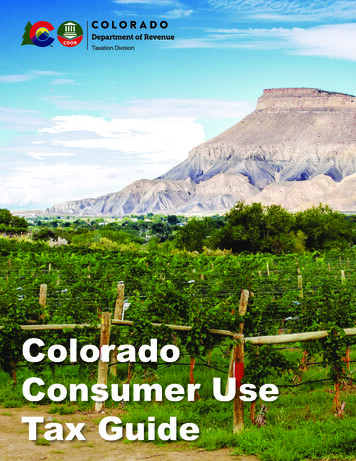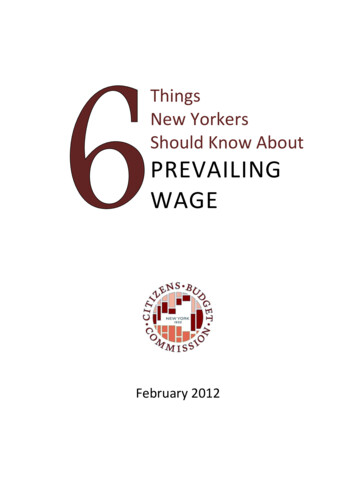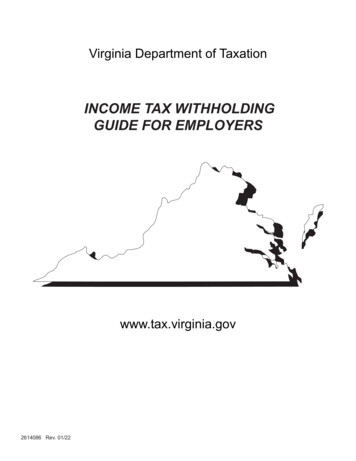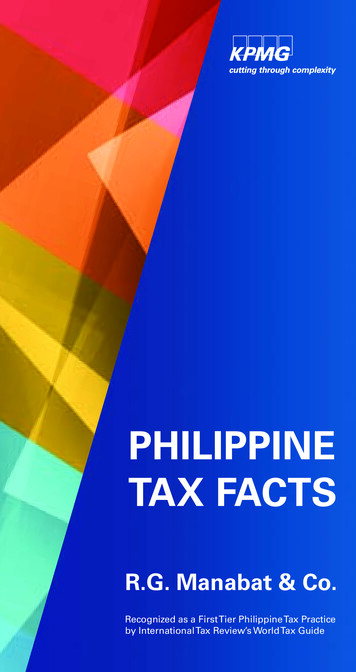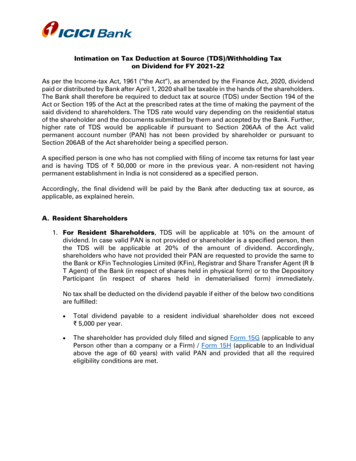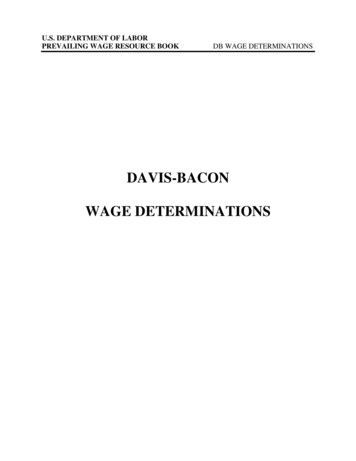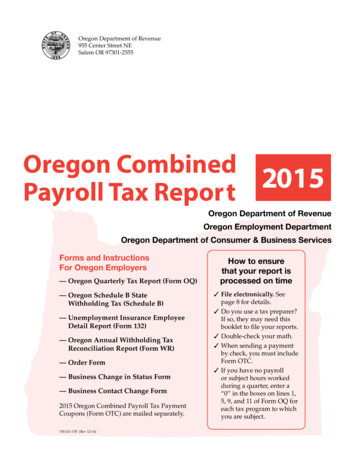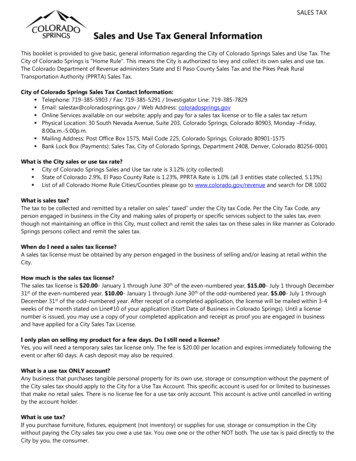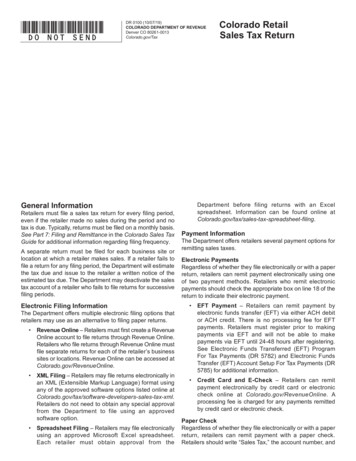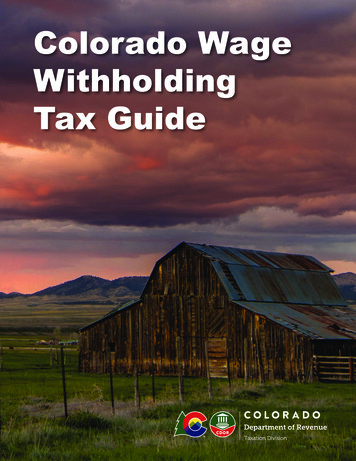
Transcription
Colorado WageWithholdingTax Guide
Colorado Wage Withholding TaxEvery employer making payment of Colorado wages issubject to Colorado wage withholding requirements. Ingeneral, Colorado wages are any wages that are eitherpaid to an employee who is a Colorado resident or paidto any nonresident employee for services performed inColorado. Any employer that is subject to Coloradowage withholding requirements must register with theColorado Department of Revenue.Table of ContentsPart 1: Employers Who Must Withhold . . . . . . . . . 2Part 2: Wages Subject to Withholding . . . . . . . . . 4Part 3: Collection and Remittance . . . . . . . . . . . 7Part 4: W-2 Wage and Tax Statements . . . . . . . . 11In general, whenever federal wage withholding isrequired for any Colorado wages, Colorado wagewithholding is required as well. Wages that are exemptfrom federal wage withholding are generally alsoexempt from Colorado wage withholding. However,several criteria, including the state of residency for theemployee, may determine whether Colorado wagewithholding is required.Appendix A: Electronic W-2 Specifications . . . . . . 13Statutes and regulations § 39-22-604, C.R.S. Withholding tax. § 39-22-621, C.R.S. Interest and penalties.An employer who is required to withhold Coloradoincome tax from employees’ wages is liable for therequired withholding, whether or not the employeractually withholds the tax. The Colorado WithholdingWorksheet for Employers (DR 1098) prescribes themethod for calculating the required amount ofwithholding. Employers are required to file returns andremit tax on a quarterly, monthly, or weekly basis,depending on the employer’s total annual Colorado wagewithholding liability. Rule 39-22-604. Colorado Income Tax Withholding. Special Rule 1. Electronic Funds Transfer. 26 U.S.C. § 3401. Definitions. 26 U.S.C. § 6051. Receipts for employees. 26 U.S.C. § 6071. Time for filing returns and otherdocuments. 26 CFR § 31.3401(a)-1. Wages.Every employer must prepare a W-2 for each employeeto report the Colorado income taxes withheld from eachemployee’s pay. The employer must provide copies ofthe W-2 both to the employee and to the Department nolater than January 31st of the following year.Forms and guidance Tax.Colorado.gov Colorado Withholding Worksheet for Employers(DR 1098)This publication is designed to provide employers withgeneral guidance regarding Colorado wage withholdingrequirements. Additional information can be found inthe statutes, regulations, forms, and guidance listed tothe right. Nothing in this publication modifies or isintended to modify the requirements of Colorado’sstatutes and regulations. Employers are encouraged toconsult their tax advisors for guidance regardingspecific situations. Colorado W-2 Wage Withholding Tax Return (DR 1094) Annual Transmittal of State W-2 Forms (DR 1093) IRS Publication 15 (Circular E), Employer’s Tax Guide IRS Publication 15-A, Employer’s SupplementalTax Guide1Revised December 2021
Part 1: Employers Who Must WithholdEvery employer making payment of Colorado wages issubject to the requirement to withhold Coloradoincome tax from such wages. This Part 1 discussesemployers and employees subject to withholdingrequirements and provides guidance regardingemployer registration and withholding certificates.EmployeesAn employee is any individual performing services foran employer, the performance of which lationship between the parties as that of employerand employee. Employees for which Colorado wagewithholding is required include, but are not limited to:Employers and employees officers of corporations; andIn general, any employer-employee relationship forfederal income tax purposes, for which withholding offederal income tax is required, is similarly consideredan employer-employee relationship for the purposes ofColorado wage withholding requirements. Please seeIRS Publication 15 (Circular E), Employer’s Tax nships for federal wage withholding purposes. individuals, including elected officials, performingservices for any local government in Colorado, theState of Colorado, the U.S. government or anyagency or instrumentality thereof.An employer is required to withhold Colorado incometax from wages paid for services performed: either wholly or partially in Colorado by anemployee who is not a Colorado resident; orEmployers either inside or outside of Colorado, or both, by anemployee who is a Colorado resident.An employer is anyone for whom any employeeperforms or performed any services, of whatevernature, in exchange for payment of wages. Anemployer may be an individual, firm, corporation,partnership, limited liability company, or any otherlegal entity.In the case of employees who perform services bothinside and outside of Colorado, the portion of suchwages that are subject to Colorado wage withholding isdetermined by multiple factors. Please see Part 2 ofthis publication for additional information.Any employer who either transacts business in Coloradoor derives any income from Colorado sources is subjectto Colorado wage withholding requirements, regardlessof whether the employer maintains a permanent placeof business in Colorado. Colorado wage withholdingrequirements apply to anyone who has control of thepayment of wages or is the officer, agent, or employeeof the person having control of the payment of wages.2Revised December 2021
Part 1: Employers Who Must WithholdEmployer registrationWithholding certificatesEvery employer who is required to withhold Coloradoincome tax must apply for and maintain an activeColorado wage withholding account. Employers mayapply for an account online at mybiz.colorado.gov orby preparing and submitting a Colorado Sales Tax andWithholding Account Application (CR 0100AP).On or before an employee’s first day of employment,the employer must have the employee complete anEmployee's Withholding Certificate, IRS Form W-4. Inaddition to IRS Form W-4, an employee may elect tocompleteaColoradoEmployeeWithholdingCertificate, form DR 0004. Information provided on theIRS Form W-4 or Colorado form DR 0004 is required tocalculate the required amount of withholding inaccordance with the instructions provided in theColorado Withholding Worksheet for Employers(DR 1098).An employer that goes out of business, dissolves or ismerged into another corporation, no longer hasemployees, or otherwise ceases paying wages must,within 30 days of the final payment of wages, notifythe Department and close their account either onlineat Colorado.gov/RevenueOnline or by preparing andsubmitting an Address Change or Business Closure Form(DR 1102).An employer must file promptly with the Department acopy of an employee’s IRS Form W-4 if all of thefollowing conditions are met: The employee is expected to earn more than 200per week. The employee claims exemption from withholdingon their IRS Form W-4. The employee does not submit a completedColorado form DR 0004 to the employer.Along with the copy of IRS Form W-4, the employermust submit a cover letter listing the employer’s name,address, federal employer identification number(FEIN), and the number of forms submitted, if theemployer is submitting forms for multiple employeeswith the letter. Employers must submit the requiredcertificates and cover letter to:Colorado Department of RevenueDiscovery SectionPO Box 17087Denver, CO 80217-0087Following a review of the forms and informationsubmitted to the Department, the Department willadvise the employer of any necessary adjustment tothe employee’s withholding certificate.3Revised December 2021
Part 2: Wages Subject to WithholdingIn general, any wages that are subject to federal wagewithholding requirements and are paid to either anemployee who is a Colorado resident or an employeewho is not a Colorado resident, but who performed workin Colorado, are subject to Colorado wage withholding.However, a variety of rules, based in part on theemployee’s state of residence, affect the taxability ofcertain types of wages. This Part 2 provides guidance fordetermining whether an employee’s wages are subjectto Colorado wage withholding.Resident employeesWagesColorado wage withholding is not required forcompensation paid to a Colorado resident for activeduty service in the armed forces of the United States ifthe servicemember’s home of record is Colorado, theservicemember became a resident of another state,and then reacquired Colorado residency. SeeDepartment publication Income Tax Topics: MilitaryServicemembers for additional information.In general, an employer must withhold Coloradoincome tax from all wages paid to any employee who isa Colorado resident, regardless of whether theemployee performed services inside or outside ofColorado, or both. However, Colorado withholding isnot required for wages paid to a Colorado resident forservices performed in another state that imposesincome tax withholding requirements on such wages.Wages subject to Colorado wage withholdingrequirements generally include any wages subject tofederal wage withholding requirements. Wages subjectto federal wage withholding requirements generallyinclude all compensation paid by an employer to anemployee for services performed. The compensationmay be paid in cash or made in other forms. Salaries,vacation allowances, bonuses, commissions, and fringebenefits are all forms of compensation subject toColorado and federal wage withholding requirements.Please see IRS Publication 15 (Circular E), Employer’sTax Guide for additional information about wages andcompensation that are subject to wage withholdingrequirements.Exempt wagesUnder certain circumstances, wages may be exemptfrom Colorado wage withholding requirements, even ifsuch wages are paid to a Colorado resident or forservices performed in Colorado.Wages that are exempt from federal wage withholdingare generally exempt from Colorado wage withholding.See IRS Publication 15 (Circular E), Employer’s Tax Guidefor additional information about wages and compensationthat are exempt from wage withholding requirements.Additionally, state and federal law provide exemptionsfrom Colorado wage withholding for nonresidents in avariety of other circumstances, discussed later in thisPart 2.4Revised December 2021
Part 2: Wages Subject to WithholdingNonresident employeesCalculating Colorado Wages for NonresidentsIn general, an employer must withhold Coloradoincome tax from wages paid to any employee who isnot a Colorado resident for any services performed bythat nonresident employee in Colorado. Services areperformed in Colorado if the employee is physicallypresent in Colorado at the time the employeeperformed the services.The following example illustrates the calculation ofColorado wages, subject to Colorado wage withholding,for a nonresident employee who works both inside andoutside of Colorado during the pay period.A nonresident employee performs services for hisemployer over a weekly pay period. Monday: The employee performs servicesexclusively in California.If a nonresident employee performs services both insideand outside of Colorado during a pay period, theemployee’s wages are apportioned to Colorado basedon the number of days during the pay period theemployee performs services in Colorado in relation tothe total number of days the employee performedservices during the pay period. An employee is deemedto have performed services in Colorado on any day inwhich the employee is physically present in Coloradofor the majority of the time during which the employeeperforms services on such day. Tuesday: The employee spends four hoursperforming services in California, after which theemployee takes a two-hour flight to Colorado. Theemployee performs no additional services onTuesday after arriving in Colorado. Wednesday: The employee performs servicesexclusively in Colorado. Thursday: The employee spends two hoursperforming services in Colorado, before taking atwo-hour flight back to California. The employeeperforms services for two additional hours afterarriving in California on Thursday.An employee is deemed to be physically present inColorado during any time the employee spendstravelling to Colorado to perform services. Anemployee is not deemed to be physically present inColorado during any time the employee spendstravelling in departing from Colorado. Friday: The employee performs servicesexclusively in California.The employee is deemed to be physically present inColorado for the two hours he spends travelling toColorado on Tuesday, but is not deemed to haveperformed services in Colorado on Tuesday because hewas not physically present in Colorado for the majority ofthe time during which he performed services that day.The following example illustrates the calculation ofColorado wages for a nonresident employee who worksboth inside and outside of Colorado.The employee is not deemed to be physically present inColorado for the two hours he spends travelling indeparting Colorado on Thursday. He is not deemed tohave performed services in Colorado on Thursday becausehe was not physically present in Colorado for the majorityof the time during which he performed services that day.Exempt wages for nonresident employeesThe table below lists certain types of wages paid tononresident employees that are exempt from Coloradowage withholding requirements.The employee spent one day (Wednesday) out of the fivedays during the weekly pay period performing services inColorado. Therefore, one-fifth or 20% of the employee’swages for the pay period are Colorado wages subject toColorado wage withholding.5Revised December 2021
Part 2: Wages Subject to WithholdingExempt Wages for Nonresident EmployeesType of employeeExempt wagesLegal authorityRail carrier employeeCompensation paid for the performance of regularly assigned dutieson a railroad in more than one state49 U.S.C. § 11502Air carrier employeeCompensation paid for employee’s work for air carrier, providedno more than 50% of the employee’s pay is earned in Colorado49 U.S.C. § 40116(f)Motor carrieremployeeCompensation paid for the performance of regularly assignedduties in two or more states with respect to a motor vehicle49 U.S.C. § 14503(a)MilitaryservicememberCompensation paid for military serviceSpouse of militaryservicememberCompensation paid to the spouse of a military servicemember ifsuch spouse is in Colorado solely to be with the servicememberserving in compliance with military orders50 U.S.C. § 4001(c)Film and televisionproduction employeeCompensation paid for the performance of services in connectionwith any phase of a motion picture, television production, ortelevision commercial for less than 120 days during the calendaryear§ 39-22-604(2)(a), C.R.S.Disaster-relatedworkerCompensation paid for the performance of work related to adeclared state disaster emergencyTelecommutersCompensation paid for work performed at locations outside ofColorado, regardless of the business location of the employer50 U.S.C. § 4001(b)§ 39-22-109(2)(b), C.R.S.§ 39-22-604(19), C.R.S.§ 39-22-104(4)(t), C.R.S.Rule 39-22-604(6),§ 39-22-109, C.R.S.Rule 39-22-109(3)(b)(i)(A)6Revised December 2021
Part 3: Collection and RemittanceEmployers who are required to withhold Colorado incometax from employees’ wages are liable for the requiredwithholding, regardless of whether they actually withheldthe required amounts. Employers are required to filereturns and remit tax on a quarterly, monthly, or weeklybasis, depending upon the employer’s total annualwithholding liability. The Department offers multiplefiling and payment options, although employers may berequired to remit payment electronically. This Part 3provides information regarding employer liability, filingrequirements, and payment options.Employer protectionsEmployer liability for taxFiling frequency and due datesEvery employer is liable for any amounts of wagewithholding required pursuant to Colorado law, thisguidance, and the instructions provided in the ColoradoWithholding Worksheet for Employers (DR 1098),irrespective of whether the employer actually deductsand withholds such amounts. In addition to any requiredamount an employer fails to withhold, the employer willbe liable for any penalty and interest applicable thereto.In the event that the employee files a Colorado individualincome tax return and pays any applicable tax due, theemployer will be relieved of liability for the amount theemployer failed to withhold, but will not be relieved ofliability for any penalties or interest applicable thereto.An employer is required to file returns and remit wagewithholding tax quarterly, monthly, or weekly basedupon the employer’s annual wage withholding liability.The required filing and remittance frequency is basedinitially on the employer’s estimated annual Coloradoincome tax withholding, reported on the employer’sapplication for a wage withholding account. If anemployer’s actual Colorado income tax withholding forany calendar year exceeds the initial estimate, theDepartment will adjust the employer’s required filingand remittance frequency accordingly. Changes to theremittance frequency take effect on January 1.All Colorado income tax deducted and withheld by anemployer from the wages of an employee is consideredto be payment of Colorado income tax by theemployee. An employee has no right of action againstan employer with respect to any amounts deducted andwithheld from the employee’s wages and paid over tothe Department in compliance or in intendedcompliance with the withholding requirementsprescribed by Colorado law.Each return and remittance must include all Coloradowage withholding for wages paid during the filingperiod, even if the employees’ work to earn the wageswas not performed during the filing period.Every employer who deducts and withholds anyamounts of Colorado wage withholding must hold suchamounts in trust for the State of Colorado. In order tosecure the payment of any amounts withheld and notremitted, the State of Colorado and the Departmenthave a lien upon all of the assets of the employer andall property owned or used by the employer in theconduct of the employer’s business. Property that issubject to the lien includes, but is not limited to, stockin trade, business fixtures, and equipment. The lien isprior to any lien of any kind whatsoever, includingexisting liens for taxes. See section 39-22-604(7), C.R.S.,for additional information about property in which aparty other than the employer has an interest.The due dates for an employer’s filing and remittanceare based upon the required frequency for theemployer’s filing and remittance. If the due date forfiling a return and remitting tax falls upon a Saturday,Sunday, or legal holiday, the return and tax are due onthe next business day. An employer that goes out ofbusiness, dissolves or is merged into anothercorporation, no longer has employees, or otherwiseceases paying wages must file a final wage withholdingreturn and remit all applicable taxes within 30 days ofthe final payment of wages, unless otherwise requiredto file and remit tax sooner.7Revised December 2021
Part 3: Collection and RemittanceMonthly and quarterly filers – but not weekly filers – arerequired to file a return for each period, even if no tax isdue. An employer who properly withheld no tax for amonthly or quarterly filing period must file a return toreport that no tax is due. If an employer fails to file arequired return, the Department may estimate the amountof tax due, based on available information, and issue theemployer a notice of deficiency for the tax due.An employer whose business does not operatecontinuously throughout the year may requestpermission from the Department to file returns for onlythose periods that the business is in operation. If theDepartment grants such approval, the employer is notrequired to file returns for those months for which thebusiness does not operate.Filing Frequency and Due DatesFiling frequencyAnnual withholdingFiling periodsDue dateQuarterlyLess than 7,000Each calendar quarter endingMarch 31st, June 30th, September30th, and December 31stLast day of the month followingthe close of the calendar quarterMonthlyAt least 7,000, butnot more than 50,000Each calendar month15th day of the following monthWeekly 50,000 or moreEach week beginning on Saturdayand ending on Friday3rd business day following theFriday that concludes the weekWeekly filingYear-end weekly filing periodExcept for year-end filing periods, Friday is the end ofeach weekly filing period, even if the employer’s payperiods end on a different day. For each weekly filingperiod during which wages are paid, an employer mustreport and remit any required withholding for any wagespaid during the period. When remitting payments viaelectronic funds transfer (EFT), the employer mustindicate the Friday that ends the weekly filing period asthe end date for the filing period.Each year, employers who remit Colorado wagewithholding on a weekly basis will have a final filingperiod ending on December 31st, regardless of whetherDecember 31st falls on a Friday. Employers must remitfor this filing period any Colorado withholding forwages paid after the Friday that ended the lastpreceding filing period and either on or beforeDecember 31st. Payment for this final filing period isdue on the third business day after December 31st.Example of Weekly Filing Period and Due ursday282930End date forfiling period456Payroll31123FridayFiling due dateIn this example, the employer’s payment of wages on Tuesday, the 27th, falls within the filing period ending Friday, the30th. The wage withholding for this weekly filing period must be remitted to the Department by Wednesday, the 4 th.8Revised December 2021
Part 3: Collection and RemittanceFiling and payment optionsPaper returnsEmployers may elect or may be required to file and paywage withholding tax electronically. The differentfiling and payment options are described below.An employer who is not required to remit payments viaEFT can instead make payments with a Colorado W-2Wage Withholding Tax Return (DR 1094). Paper returnsand payments made by check or money order must bepostmarked on or before the applicable due date to beconsidered timely.Electronic funds transfer (EFT)Any employer who is required to remit wage withholdingtax on a weekly basis is required to remit payment viaelectronic funds transfer (EFT). Employers areencouraged to remit payment via EFT, even if they arenot required to do so, because electronic paymentreduces the potential for processing errors and delays.Withholding payments made via EFT satisfy bothpayment and filing requirements. Employers who remitpayment via EFT are not required to submit any separatequarterly, monthly, or weekly wage withholding return.If no tax is due for a filing period, an employer canreport zero tax through the EFT payment system.Correcting errors in filed returnsIf a previously filed return did not report the correctamount of wage withholding for the filing period, themethod for correcting the error depends on whether thetax was underpaid or overpaid with the filed return.Underpayments of taxIf the wage withholding tax due for a filing period is greaterthan the amount previously reported and paid, theadditional tax can be reported and paid via EFT, online atColorado.gov/RevenueOnline, or by filing a secondColorado W-2 Wage Withholding Tax Return (DR 1094). Anyreturn filed to report additional tax should not include anywage withholding tax previously reported and paid.EFT payments must be made on or before 4:00 P.M.Mountain Time on the due date of the tax payment to beconsidered timely. Payments made after 4:00 P.M. areconsidered to be made on the following day.Employers must register with the Department to makepayments via EFT. Registration can be made either onlineat Colorado.gov/RevenueOnline or by completing andsubmitting an Electronic Funds Transfer (EFT) AccountSetup For Tax Payments (DR 5785). An employer mustfirst sign up and create a login ID for Revenue Online inorder to register for EFT online. Please see ColoradoDepartment of Revenue Electronic Funds Transferred(EFT) Program For Tax Payments (DR 5782) for additionalinformation regarding EFT payments and registration.Overpayments of taxIf an employer overpays the wage withholding tax due forany filing period, the employer can deduct the amount ofthe overpayment from the tax reported and remitted for anysubsequent filing period during the same calendar year.If the calendar year has ended and the employer istherefore unable to deduct the overpayment from the taxdue for a subsequent period, the employer can claim arefund for the overpayment when filing the AnnualTransmittal of State W-2 Forms (DR 1093). Any FormDR 1093 filed to claim a refund for an overpayment mustbe filed prior to January 31st of the following year.Other electronic filing and payment optionsEmployers who are not required to make payment viaEFT can file returns and make payments electronicallyonline at Colorado.gov/RevenueOnline. An employermust first sign up and create a login ID for RevenueOnline in order to file and pay through Revenue Online.A third-party processing fee is added to any e-check orcredit card payment made through Revenue Online.If an overpayment of wage withholding tax is identifiedonly after January 31st of the following year and the filingof Form DR 1093, the employer can file a Claim for Refund(DR 0137) to request a refund for the overpayment.9Revised December 2021
Part 3: Collection and RemittancePenalties and interestAssessments and appealsIf any tax is not paid by the applicable due date, theemployer will owe a penalty. The penalty is the greater ofeither 5 or 5% of the unpaid tax, plus an additional 0.5%for each month the tax remains unpaid, not to exceed atotal of 12%. A collection penalty equal to 15% of theunpaid tax is also imposed if an employer fails to remitpayment within the time provided in any notice anddemand for payment. Additional penalties may be imposedfor:If, upon review of any relevant information, theDepartment determines the correct amount of tax hasnot been paid, the Department will issue a notice ofdeficiency to the employer. An employer who receivesa notice of deficiency may submit a written protest andrequest a hearing to dispute the notice. Any protest orrequest for hearing must be submitted within 30 daysof the date of the notice. The protest or request forhearing must contain at least the followinginformation: fraudulent or willful failure to file; the employer’s name, address, and accountnumber; filing a fraudulent, frivolous, or willfully falsereturn; the tax period(s) involved; fraudulently failing to pay tax; or the type and amount of tax in dispute; and willfully seeing to evade tax. a summary statement of the findings with whichthe taxpayer does not agree and the grounds uponwhich the employer relies for the purpose ofshowing the tax is not due.Interest accrues on any late payment of tax from theoriginal due date of the tax to the date the tax is paid.The rate of interest accrual depends on the calendaryear(s) over which the deficiency continues.Additionally, a discounted rate is allowed if theemployer pays the tax in full prior to or within 30 daysof the issuance of a notice of deficiency. Thediscounted and non-discounted, regular interest ratesfor recent years are listed in the following table.The protest or request for hearing must be signed bythe employer. A protest or request for hearing may besubmitted online at Colorado.gov/RevenueOnline or bymail, fax, or email in accordance with instructionsincluded in the notice.Annual Interest RatesCalendar yearDiscounted rateRegular sed December 2021
Part 4: W-2 Wage and Tax StatementsEvery employer that is subject to Colorado wagewithholding requirements must provide both theDepartment and each employee with a Wage and TaxStatement, IRS Form W-2 reporting the employee’sColorado wages and Colorado withholding for eachcalendar year.Nonresident employeesThe W-2 provided to any employee who is not aresident of Colorado must report any Colorado incometax withheld from the employee’s wages, as well as anywages that were paid to the employee for servicesperformed in Colorado and that are not exempt fromColorado income tax under either state or federal law.See Part 2 of this publication for additional informationregarding Colorado withholding requirements withrespect to nonresident employees.Providing W-2s to employeesFederal law requires employers to provide eachemployee a Wage and Tax Statement, IRS Form W-2,reporting wage and tax information for each calendaryear. In addition to federal tax information, theemployer must also report the employee’s Coloradowages and withholding on the W-2. The employer mustsend the W-2 to the employee by January 31st of thefollowing year. An employer that goes out of business,dissolves or is merged into another corporation, nolonger has employees, or otherwise ceases paying wagesmust provide W-2s to all employees within 30 days of thefinal payment of wages.Filing W-2s with the DepartmentEvery employer that is subject to Colorado wagewithholding requirements must file with theDepartment any W-2 reporting Colorado wages orColorado withholding. The required W-2s for anycalendar year must be filed with the Department on orbefore January 31st of the following year. An employerthat goes out of business, dissolves or is merged intoanother corporation, no longer has employees, orotherwise ceases paying wages must file W-2s with theDepartment within 30 days of the final payment ofwages.Any W-2 reporting Colorado tax information may befurnished to the employee electronically, to the extentpermitted by federal law. Please see IRS Pub
IRS Publication 15 (Circular E), Employer's Tax Guide for guidance relating to employer-employee relationships for federal wage withholding purposes. Employers An employer is anyone for whom any employee performs or performed any services, of whatever nature, in exchange for payment of wages. An

